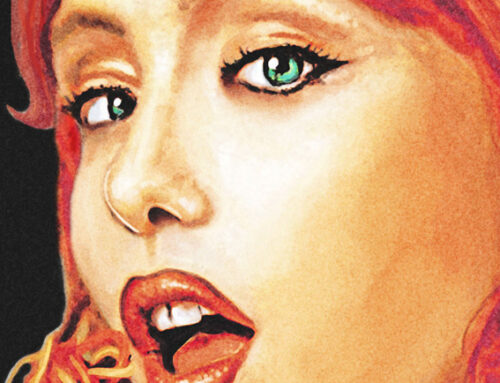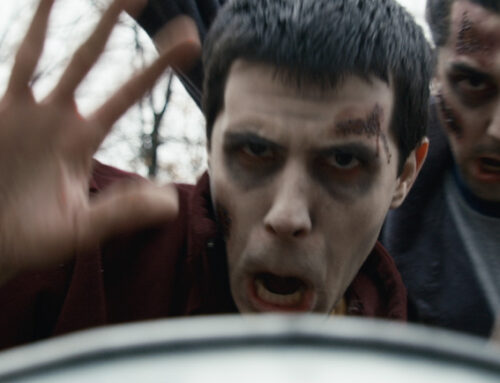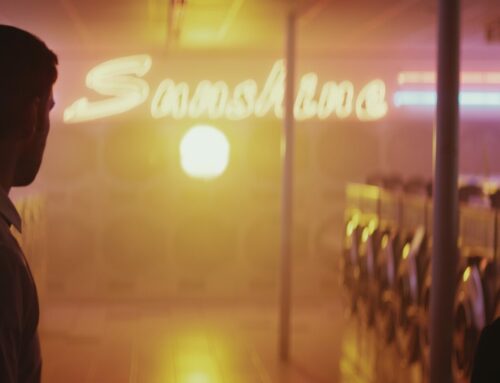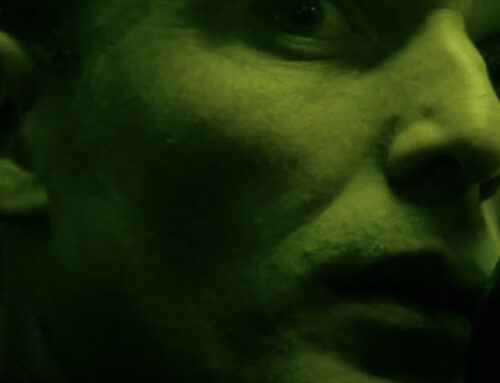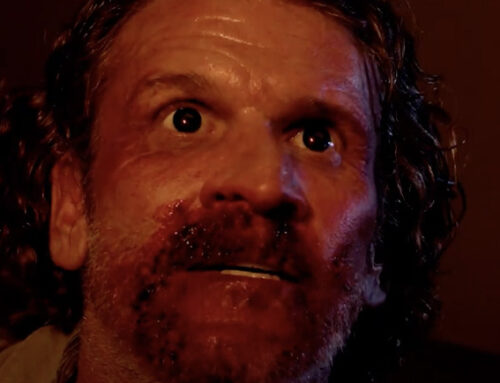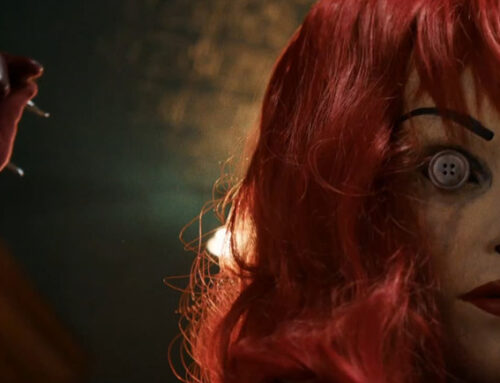Composer Kenny Wood knows that suspense, thrillers, and horrors are the perfect vehicle for his “no holds barred” approach to composing. Utilizing both his background as a classically-trained composer and his guerrilla sound making skills, Wood is creating innovative musical gestures in the genre. His arrangement work on Scream (2022) carved him a place in the horror/action/suspense space, as well as his time on Swamp Thing, Rambo: Last Blood, and Those Who Wish Me Dead, starring Angelina Jolie.
Recently, Kenny Wood composed Gallop: Hell of a Game, a horror comedy about a group of friends who reunite after years apart and must play and win a drinking game before sunrise, or risk the eternal punishment of playing the game forever in hell. The film marks the feature directorial debut of Alberto Belli. For this project, Wood sourced sound from common household objects, including shot glasses, to accompany the genre-bending tone, elevating the characters’ journeys, and to prolong the suspense.
In this interview, Wood expands on his refreshing approach to making music, his experience working in the horror/suspense genres, and his time on Gatlopp: Hell of a Game.

What is your favorite thing about composing a score for a horror project?
Kenny Wood (KW): There is so much to enjoy about composing horror scores–not the least of which is that horror is a special category of entertainment where similar to animation, video games, or even classical music or songwriting, you can wear your heart on your sleeve and go full throttle at what you’re trying to convey. It’s a genre that has moments for subtlety, sure, but it also provides lots of runway for artists who like to put the pedal-to-the-metal. And this isn’t just for the horrific parts, this is also for tragic and emotional scenes, heroic moments, and any place where music can carry the storytelling load for a good chunk of time. Horror is amazing for that.
What do you find to be the most challenging part about composing for the horror genre?
KW: Horror has similar challenges to any type of genre such as finding the perfect tone and pacing as well as crafting themes that capture everything you want to convey about a character or feeling. But horror also has some unique challenges of its own due to the fact that it typically contains a lot of flash-in-the-pan moments like jump-scares, cliffhangers, and gross-outs. These things are so short (often a few seconds or less), but so musically important, as well as the purpose they serve in the story. It often takes more time to craft those hits than it does to spin through a melody for a minute or more. Part of that challenge is keeping them fresh and interesting. In the horror projects for which I’ve composed or contributed, I must have created hundreds of these, but I know for sure that none of them sound alike. They’re each tailored to the context and story in which they appear, but they also serve their main purpose as well, which is to FREAK OUT the viewer.
Do you have a favorite scene that you composed for Gatlopp: Hell of a Game?
KW: The entire movie was a blast. Alberto made every single scene just right in terms of pacing and how well the jokes or seriousness landed. So weaving notes through each cue felt so natural, I honestly would take all of them as a favorite. In the spirit of picking one (or several) though, the main title was a real joy to work on.. it’s a rare thing these days to have an opening title sequence and this one is animated! I was hog heaven for that. But the favorite scene during the film, slightly edging out the rest, would have to be where Cliff (Jon Bass) is telling his heartbreaking story of getting stood up at high school prom and then gets abruptly cut off by a bone chilling scream from the bathroom. I won’t give away the events thereafter, but that entire sequence covers a wide range of emotions and it will get some blood pumping through your veins!

What stood out about Gatlopp: Hell of a Game that made you want to be a part of it?
KW: The short of it is that it’s got two things I love to do: comedy and horror. But really, I’m so thrilled to see friends I went to school with becoming successful and getting their projects made. Alberto and I were classmates at USC and we’ve been working on shorts, commercials, and viral videos since 2011. I absolutely love the unflinching way he tells stories and brings characters to life so anytime he asks me to be a part of something, I KNOW it’s going to be amazing and I won’t ever hesitate to jump at the opportunity. Gatlopp is his feature debut (an incredible one at that) and I’m so lucky to have been involved. It’s a fun and fantastic movie.
Are there any specific sounds or instruments you like to include in your horror scores?
KW: For every project, horror or otherwise, I make it a point to start off with some playtime, where I can experiment with new and unusual sounds and see what might possibly stick to a project’s score. As a classically trained composer, I love writing for the orchestra and pushing that to its limits, but I equally love to grab household objects, discarded hardware, custom built things, or synthesizers to find new pieces of ear candy. In the case of Gatlopp, which centers around a drinking game, we used actual shotglasses and beer bottles as part of the soundscape. You can hear them played in all sorts of ways throughout the entire score!

How do you add suspense while composing a horror score?
KW: There are too many ways to go through all of them, but primarily, I think about what the suspense needs to accomplish. Does it need to excite? To make things uncomfortable? To prolong something? To create a sense of impatience? Whichever it is, I’ll translate that to a musical gesture, which could be taking away rhythmic elements so that it becomes more difficult to track the passage of time. This technique can make a short scene feel twice as long and uncomfortable. I could even fade out and take all the music away, leaving the viewer with only their imaginations on what will happen next and THAT is always a useful trick for suspense. There’s nothing more eerie than when the music that was holding your hand through a scene just vanishes without a trace… and it’s even better when done without the viewer noticing!
How do you include both comedic and horror elements in a dark comedy thriller score, such as Gatlopp: Hell of a Game?
KW: I love this question. This was the main challenge of the whole film and how we did it was by first determining a few rules. First thing was that it needs to be fun. The movie is about a game and at all times we should want the story to propel forward, so make it exciting for the viewer to see what happens next. Second, at key points throughout the movie, we should be on the edge of our seats, not knowing if the next moment is going to make us laugh, or make us soil our pants, or both! A lot of the work to make that possible was put into the music that sets up these moments. The last thing was making sure the music follows the characters as they become more and more burdened with having to tell the truth about their deepest darkest secrets. Through that, which was aided by some stellar performances from the cast, we could establish a really wide emotional range from bright and energetic to dark and ominous. I can mostly certainly say, the success of this project comes through a team effort. Without a great script, great cast, great directing, great cinematography, great editing, great sound, and great score mix, this whole concept could have fallen flat. I really credit the insanely talented cast and crew who paved the way for me to do my little part and glue it all together.
–

